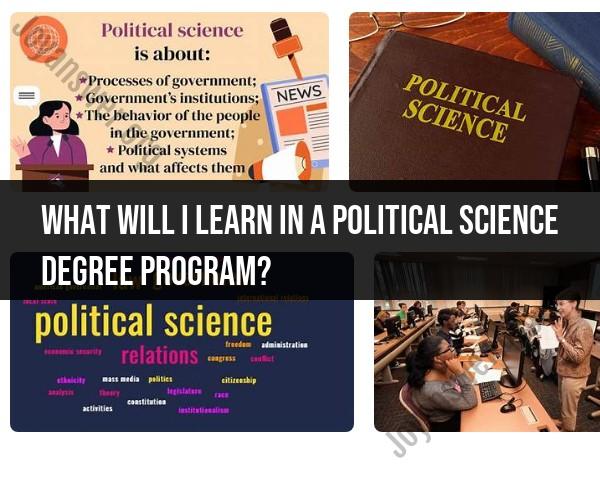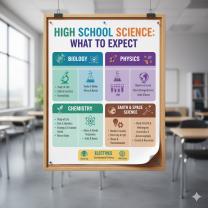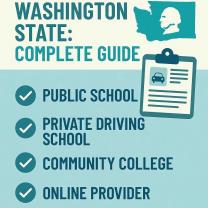What will I learn in a political science degree program?
A political science degree program covers a wide range of topics related to government, politics, public policy, and international relations. Students in a political science program can expect to learn about various key areas of study, including:
Political Theory: Political theory explores the ideas, concepts, and ideologies that shape political systems and institutions. Students study the works of political philosophers such as Plato, Aristotle, Machiavelli, Hobbes, Locke, Rousseau, Marx, and others to understand different theories of justice, democracy, power, and governance.
Comparative Politics: Comparative politics involves the study of different political systems, institutions, and practices around the world. Students examine factors such as political culture, regime types, electoral systems, political parties, and governance structures in various countries and regions.
American Government and Politics: This area of study focuses on the political institutions, processes, and actors in the United States. Students learn about the structure of government, the Constitution, federalism, Congress, the presidency, the judiciary, political parties, elections, and public policy debates in the U.S.
International Relations: International relations explores the interactions between states, international organizations, non-state actors, and global issues. Students study topics such as diplomacy, conflict resolution, international law, security studies, globalization, human rights, and global governance.
Public Policy Analysis: Public policy analysis involves the study of how policies are formulated, implemented, and evaluated. Students learn about policy research methods, policy analysis frameworks, policy-making processes, and the role of government in addressing social, economic, and environmental issues.
Political Economy: Political economy examines the relationship between politics and economics. Students study topics such as economic theories, market structures, government regulation, public finance, income distribution, globalization, and development policies.
Political Methodology: Political methodology focuses on research methods and statistical techniques used in political science research. Students learn how to design research studies, collect and analyze data, and draw conclusions from empirical evidence.
Public Administration and Management: Public administration and management explore the principles and practices of government administration and organizational leadership. Students learn about public sector management, bureaucratic institutions, public service delivery, policy implementation, and organizational behavior.
Political Communication: Political communication examines the role of media, technology, and communication strategies in shaping political discourse, public opinion, and electoral campaigns. Students learn about media influence, political advertising, propaganda, digital democracy, and media ethics.
Policy Specializations: Many political science programs offer specialized courses or concentrations in specific policy areas such as environmental policy, health policy, education policy, foreign policy, social policy, and urban policy. These courses provide in-depth knowledge and skills in analyzing and addressing policy challenges in specific domains.
Overall, a political science degree program provides students with a comprehensive understanding of political systems, government institutions, policy processes, and global affairs. Graduates of political science programs pursue diverse career paths in government, public administration, international organizations, non-profit organizations, advocacy groups, research institutions, journalism, law, business, and academia.
1. Key Subjects Covered in a Political Science Degree Program
A political science degree program typically covers a wide range of subjects related to government, politics, and society. Here are some of the key areas of study:
- American Government: This course examines the structure and function of the U.S. government, including the Constitution, Congress, the presidency, the judiciary, and the federal system.
- Comparative Politics: This course compares and contrasts the political systems of different countries around the world.
- International Relations: This course examines the relationships between countries, including diplomacy, war, and trade.
- Political Theory: This course explores the different philosophical perspectives on government and politics.
- Public Policy: This course examines the process of making and implementing government policy.
- Research Methods: This course teaches students how to conduct research in political science.
In addition to these core courses, many political science programs also offer a variety of electives, such as:
- Environmental Politics
- Women and Politics
- Race and Politics
- Political Economy
- Law and Politics
2. How a Political Science Degree Prepares Students for the Workforce
A political science degree can prepare students for a variety of careers in the public and private sectors. Here are some of the skills that political science majors develop:
- Critical thinking: Political science majors learn to analyze complex issues and develop well-reasoned arguments.
- Research and writing: Political science majors learn to conduct research, gather evidence, and write persuasive essays and reports.
- Communication: Political science majors learn to communicate effectively, both orally and in writing.
- Problem-solving: Political science majors learn to identify problems, analyze potential solutions, and make informed decisions.
- Organization and time management: Political science majors learn to manage their time effectively and meet deadlines.
These skills are valuable in a variety of careers, such as:
- Government: Political science majors can work in all levels of government, from local to federal.
- Politics: Political science majors can work for campaigns, political parties, or interest groups.
- Law: Political science majors can attend law school and become lawyers or judges.
- Business: Political science majors can work in a variety of business settings, such as public relations, marketing, or human resources.
- Nonprofit organizations: Political science majors can work for nonprofit organizations that focus on issues such as poverty, education, or the environment.
3. Specialized Areas of Study Within Political Science
There are many specialized areas of study within political science. Here are a few examples:
- American Politics: This area of study focuses on the U.S. government and politics, including Congress, the presidency, the judiciary, and the federal system.
- Comparative Politics: This area of study compares and contrasts the political systems of different countries around the world.
- International Relations: This area of study examines the relationships between countries, including diplomacy, war, and trade.
- Political Theory: This area of study explores the different philosophical perspectives on government and politics.
- Public Policy: This area of study examines the process of making and implementing government policy.
Students who are interested in a particular area of study can choose to take electives and complete a capstone project in that area. They can also pursue a minor or a double major in a related field.













